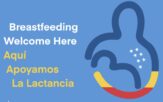November kicked off Black Babies Awareness Month, a campaign led by the Equity Research Action Coalition at the University of North Carolina-Chapel Hill that calls to protect, promote, and preserve the health and wellbeing of Black infants and families.
In 2021, women who gave birth in Durham County tended to be older and more educated compared to all women who gave birth statewide. Additionally, non-Hispanic Black women accounted for 29% of Durham County births in 2021. We know that people of color are disproportionately impacted by health disparities leading to increased infant mortality, child poverty, and other poor maternal-child health outcomes.
Durham County has a higher percentage of women who breastfed at hospital discharge, but health disparities still exist. Only 76% of Black infants are ever breastfed, which falls below the national average of 84%. Research shows Black women are more likely to work hourly wage jobs that require returning to work sooner, and more Black women rely on Medicaid to cover breastfeeding education, lactation support, and breast pumps. However, North Carolina has failed to expand Medicaid, which disproportionately impacts breastfeeding rates among Black women.
Here in Durham County, ICO4MCH has selected breastfeeding as our evidence-based strategy to reduce infant mortality. The work of ICO4MCH includes providing culturally appropriate education on the initiation and continuation of breastfeeding through monthly community outreach, maintaining the Durham County Department of Public Health breastfeeding policy, and offering free prenatal breastfeeding classes. ICO4MCH continues to work with stakeholders and community-based organizations to advocate and create policies to eliminate the disparities that Black and Brown infants and families face.

